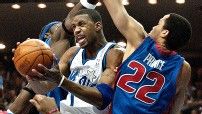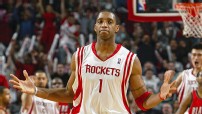It seems the end is finally here for Allen Iverson. According to a Slam report, the 11-year veteran and former MVP is planning to officially call it quits after contemplating a comeback and playing overseas in recent years.
How will we remember the former MVP and early-aughts lightening rod? Our team looks back and forward.
1. What will you remember most about Allen Iverson's career?
Henry Abbott, TrueHoop: The Sixers' delirious, enthusiastic, team-centric run to the NBA Finals in 2001, when he shattered the stereotypes in a hurricane of wins and smiles. Delightful.
Amin Elhassan, ESPN Insider: I'm a sucker for "little guys" who can hold this game of giants at their mercy, and Iverson terrorized the league in his prime despite not being much taller (and weighing wayyyyyy less than) your average American male adult. Specifically, I'll always remember his 44-point Game 7 effort in the 2001 Eastern Conference finals versus Milwaukee, and watching him skipping at the end of the game with the "ear cup" as the crowd chanted "Beat L.A."
Marc Stein, ESPN.com: The obvious nominees are (A) that Philly team of role players built specifically to let him take all the shots that he hauled to the NBA Finals and, of course, (B) his infamous "practice" press conference. But I'm choosing neither of those.
My most vivid memories of Iverson stem from an otherwise forgettable Team USA training camp in the summer of 2004 shortly before its disastrous trip to the Athens Olympics. Reason being: As a media pest, I always enjoyed Iverson's soul-baring interviews as much as his scoring binges. So I found it irresistible to be around him when he was representing his country, because he was such a proud patriot. You could tell that it really meant a lot to him to get an opportunity that, in his youth, he probably never imagined getting.
Michael Wallace, Heat Index: The cornrows. The baggy shorts. The slender, smallish frame that contained a massive heart and ego. The swagger. The way he simultaneously personified what you loved and despised about the modern NBA superstar. I grew up in Washington, D.C., and played in the same summer league circuits as Iverson, so I go back quite a ways, to his Bubba Chuck days. I'll remember his demons off the court and his dominance on it over nearly 20 years.
Brian Windhorst, ESPN.com: He was so entertaining to watch. Though he wasn't always the best teammate, it was hard not to get caught up in the way he could score. He was absolutely brilliant in creating space and overcoming his size disadvantage, and that's what made him so popular. However, it would be interesting to see how his prime would've been perceived if he had been doing it now, when there's a much greater emphasis on efficiency.
2. What will Iverson's legacy be?
Abbott: We know more about basketball. Now, it's provably true that driving one-on-five again and again may be heroic, but it's so inefficient that it ultimately hurts the team. But in his heyday, all we knew was that he was a tiny maestro, making magic night after night.
Elhassan: An incredibly gifted scorer. A talent who thrived despite being a rebellious outsider who wouldn't conform. A talent who flamed out because he was a rebellious outsider who wouldn't conform. An example and a cautionary tale. His game also brought about the beginning of mainstream attention toward the value of efficiency over points per game
Stein: He has multiple legacies. The game's historians and purists will always focus on the fact that he was the ultimate individual in a team sport, or the NBA dress code he gave birth to, but Iverson has to be one of the three or four most beloved players I've covered in my two decades on press row. And I'd argue that he's still insanely popular with large segments of the basketball public despite all the justifiable knocks he's taken. So it really depends on who you ask.
Wallace: That he was the league's pre-eminent presence who bridged the gap between Michael Jordan and LeBron James. Sure, Shaquille O'Neal, Tim Duncan, Kobe Bryant and Kevin Garnett might dispute that. And Iverson might never truly get the respect or credit he deserves for his impact on the league, from his dominant playing style to the way he presented himself socially and culturally on and off the court. No player was as controversial, galvanizing, polarizing and unstoppable as The Answer in his prime. He did it at half the size but with twice the heart of many contemporaries.
Windhorst: I'll always think of two moments. One was Game 1 of the 2001 Finals when he hit that 3-pointer late right in front of the Lakers bench and then stomped over Tyronn Lue. Iverson, fresh off winning his only MVP award, was about to go up 1-0 in the Finals with a team he totally carried there. That moment was pretty much the apex of his career, even if it was fleeting. And of course the second is the "practice" rant. He'll always be associated with it, and it will be replayed, referred to and imitated for years and years. That's the definition of legacy.
3. Should Iverson go into the Hall of Fame?
Abbott: For a good long while nobody in the game was more famous. They'd have to change the name on the door if they didn't have him in there.
Elhassan: Yes. Winning multiple scoring titles at his size has never been done before. And unlike many of today's volume scorers, his teams achieved a good deal of success in his prime. For better or for worse, Iverson changed the way the game looks at undersized SGs: players who used to have to either convert to point guards or find employment elsewhere are now accepted with open arms.
Stein: On the loose premise that NBA greats should be Hall of Famers, then, yes, I'd put Iverson in. At his peak, The Answer was an undeniable great who -- no matter what you think of his various shortcomings and transgressions -- has to go down as one of the most devastating small men this sport has ever seen. Yet I feel compelled to add that I always find this one hard to answer because there's still so much we don't know about Hall of Fame voting.
Wallace: Absolutely. He's one of the top five shooting guards of all time, alongside Michael Jordan, Kobe Bryant, Jerry West and Dwyane Wade. He was a perennial All-Star and an MVP who dominated his position in his prime. He also helped to redefine the "combo guard." His credentials speak for themselves.
Windhorst: Yes, that's an easy one. He was the greatest scorer of his era and one of the top players in the game for about a decade. Without much argument, he's one of the greatest small players of all time. He was on 11 All-Star teams, made seven All-NBA teams and won an MVP. No-brainer.
4. Will Iverson go into the Hall of Fame?
Abbott: I expect so. As Iverson did, the Hall still works with the idea that the points-per-game stat is paramount.
Elhassan: Yes, although it wouldn't surprise me if he doesn't make it on the first go-round. His clashes with his coaches, teammates, law enforcement, etc., might cause some voters to pass. But eventually he'll be there.
Stein: Probably not. Instinct tells me all the off-court troubles and his infamous rep for stubbornness/selfishness will get in the way.
Wallace: Yes. He didn't go out the way he could have or should have and he never won a title. But Iverson remarkably carried that 2000-01 76ers team to the Finals. Between his pro career and his dynamic college run at Georgetown, he'll get into the Hall. If he doesn't, the credibility of the voting process needs to be questioned.
Windhorst: Yes. His résumé is ironclad and his mark on the game was undeniable. He had off-court issues but so have many Hall of Famers. Also, they put about 10 people in the Hall every year for various accomplishments these days. It's getting less exclusive, not more.
5. What would you like to see Iverson do in the future?
Abbott: Young people find his raw emotions, passionate creativity, small stature, interesting look and gravelly voice entirely infectious. That's influence. My fantasy is that he'd spend his days on the streets of cities he loves like Philly and D.C. getting personally involved, talking about hard work, fearlessness, non-violence, the perils of gangs or whatever else he wants to talk about. (A model.) I don't expect him to do that, but he'd be amazing at it.
Elhassan: Taking care of himself and his family, first and foremost. You hate to hear about former players in financial difficulty, particularly if they played in the era of big-figure contracts. Beyond that, I think it would be nice (and amusing) if Iverson got involved with the Rookie Transition Program and helped younger players learn from some of the mistakes of his youth. He could talk about the things he'd do differently versus the things he'd do the same if he could relive his career.
Stein: Don't want to be all preachy here -- as if any of us have life all figured out -- but I'm sure I'm not alone in simply wishing that Iverson eventually finds peace in his post-NBA life. These last few years have clearly been rough on him while he clung to false hope that he'd get one more shot to go out on his terms. When we hear his name these days, it's pretty much never good news. Here's hoping that trend changes, though it's hard to imagine how.
Wallace: Those who have seen Iverson off the court would want him to address his personal issues and his family situation. As long as basketball was in his life, he had a purpose that motivated him each day. It's well-documented how he's struggled the past few years to fill that void. If he takes care of himself and his kids, and continues to use his legacy and foundation to provide college scholarships to students in his hometown, that's more than enough to ask.
Windhorst: I'd like to hear some positive stories about him instead of reading or hearing about money problems, family problems and drinking problems.











